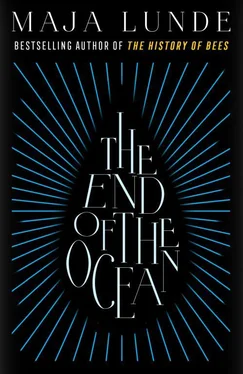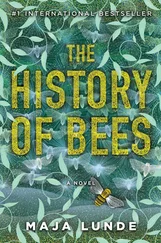I wanted to write a story, but I could only ever write about what I saw, back then as now. I could only write what I heard, because the sounds from inside the house grew louder, they grated on me, like the wind, like the cold or a storm, the words thundered through the porch door and it was impossible to write anything else.
Power company, I wrote.
Guests, I wrote.
Future, I wrote.
“The freshwater mussel will die out,” Daddy cried.
Die, I wrote, as quickly as I could. Die, died, have died.
“And the water ouzel, it lays its eggs by the river.”
A water ouzel, the water ouzel, several water ouzels, all the water ouzels.
“It’s just water,” Mommy screamed. “But it can be converted into electricity, it can create jobs. It can bring life to the village.”
“You’re just thinking about the hotel,” Daddy shouted.
“The hotel is what we live on. Have you forgotten that? Not your underpaid journal articles.”
“But this is the River Breio!”
“It’s just water.”
Water, I wrote. One water, the water, several waters, all the waters.
No. All the water.
Nobody heard me typing, how quickly I was typing, suddenly, how adept I had become at finding the letters.
We passed the fence. I led Lou out onto the highway. A light wind was blowing there. I wanted to walk briskly, taking huge strides. But Lou held me back. How tightly she hung on there, to one of my hands, while her other hand was neglected. She should have had someone’s hand to hold there as well.
The only sound was that of her shuffling child’s feet.
“Can you walk a little faster?” I asked.
“Yes.”
But she walked just as slowly, dragging her feet, and did not say a word.
Before she would have protested. Howled. Screamed.
“It would be better if you said something,” I said.
“Like what?”
“You think walking here is boring, don’t you?”
“No, I don’t.”
“Yes, you do. You hate walking.”
“No, I don’t.”
And then she really tried to walk faster. She trotted beside me.
“Take it easy,” I said.
Suddenly I felt pretty lousy.
“We’re just going for a little walk, right?” I said. “Just for something to do. A short walk.”
“How far?”
“One minute.”
She didn’t know how to tell time, had no idea that if she counted slowly to sixty, the minute would have passed, that one minute is nothing at all. Sometimes I was surprised at how easy it was to fool her, which made me feel even worse. Not because I fooled her, but because of how easy it was.
I just couldn’t bear to go back to that sweaty, claustrophobic camp. Here, out on the road, we were at least in motion. We could pretend we had a goal. But there was nothing to walk towards, nothing on which to focus your gaze. Just one little, forest-covered mound was sticking up in the landscape. A ridge was perhaps the word. Really it was no more than a bump amidst all the flatness.
A displaced bump.
*
“Has a minute passed?” Lou said after a while.
“Soon.”
“I taste like salt,” Lou said, and placed the tip of her tongue against her upper lip.
“Salt’s good,” I said.
I missed the salt. I missed the mountains and the ocean.
Here the air was dry. Earthy, almost sandy. It got into your nose. The air wasn’t fresh. While at home the smell of salt water was everywhere.
Salt purifies. Preserves things. You can put food in salt and it will be preserved forever. You can pour salt water on cuts and yes, it hurts, but salt is clean, one of the cleanest things in the world.
People have even started wars over salt.
For me, salt was my job. A job I enjoyed. I had had this job since Lou was born. I had to quit school then, bring home a paycheck. No two ways about it.
I had never thought I would stay there, in Argelès. Had always thought I would move away. Ever since I was young, I had envied the tourists who came and left every single summer. They invaded the summers for those of us who were natives, taking over, eating enormous quantities of moules-frites and sunning themselves to a crisp on the beach. Until they took their beach towels and hats and the smell of suntan lotion with them and went away.
But in recent years the tourists hadn’t come. The faucet was turned off. They disappeared. And I wanted to disappear too. From the empty restaurants, from the deserted shopping street, from the amusement park that slowly rusted away in the spray from the rising ocean, the punctured inflatable castle and the overgrown miniature golf course.
They disappeared. I stayed. With Anna, with Lou and, later, with August. In our crowded apartment by the harbor, where the salt water often forced its way into the cellar. But my job was a bright spot. The plant was located at the end of the esplanade. Before there had only been grassy dunes there, and a sun lounger rental business that had never managed to make a profit, because this was the windiest spot on the entire beach. But also the most beautiful, for those who took the time to notice and were able to ignore the wind.
I was lucky to get the job. Thomas was a friend of my father and a good boss. And my duties were fine. Noisy, but fine. We wore ear defenders to protect ourselves from the sound of the turbines. I worked with salt every day, and liked the smell. But the objective was precisely to eliminate the salt.
We monitored operations as the seawater was channeled through the turbines, separating the salt from the water, osmosis in reverse. Fresh water ran out the other end—good, clear water.
Desalination was the future, Thomas used to say. And he told us about the facilities in other places in the world, in Florida and southern Spain, where there were many. These were the facilities that irrigated the ever-expanding desert.
But with each passing day, Thomas grew more and more worried, because the machinery at the plant was constantly breaking down. Parts fell to pieces, we couldn’t replace them. And we were unable to produce enough water. We were too small-scale, and it wasn’t cheap enough, either. And when the desalination plants in Spain were leveled to the ground during the battles over the River Ebro, when our neighboring country became divided, he hardly slept at all any longer. He talked and talked about the EU. About the time when Europe was united. He talked about how everything was just disintegrating, every day he told me of a new conflict. Personally, I had given up paying attention a long time ago. I couldn’t bear to read the news. Because people were fighting everywhere, it seemed—north against south, the water nations against the drought nations. And there was also internal strife in some countries. Like in Spain.
Those who have something to protect forget about everything else, Thomas said. To each his own. Nobody takes care of anyone except their own people.
But it didn’t help that he talked, it didn’t help that I tried to listen. It didn’t help that we worked as hard as we could. It didn’t help that France had approved the construction of three new plants.
That’s how quickly things can change. One day you wake up to the sound of the alarm clock, eat breakfast, go to work, argue, laugh, make love, do the dishes, worry about your bank account being drained before the end of the month… you don’t think about how everything you have around you can disappear. Even if you hear that the world is changing. Even if you notice it on the thermometer. You don’t think about it until the day when it’s no longer the alarm clock that wakes you up in the morning, but the sound of screams. The flames have reached your city, your house, your bed, your loved ones. Your house is in flames, your bedclothes catch fire, your pillow starts smoking and you can’t do anything but run.
Читать дальше










